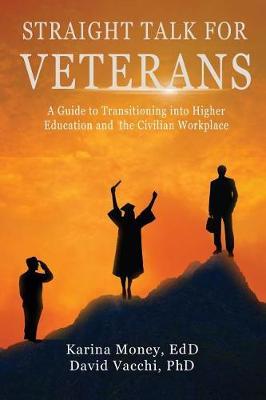Overview
Straight Talk for Veterans: A Guide to Transitioning into Higher Education and the Civilian Workplace evolved from a call by veterans and practitioners to move away from academic volumes that don't resonate with the reader and frankly fall short of really helping veterans succeed. Veteran-friendliness is a straightforward concept that is, in most contexts, more lip-service than action and is rarely achieved. Conceptualizing veteran-friendliness is best done in plain language, the way veterans talk to each other, and is about improving the cultural competency of non-veterans. Too many volumes written by people that either aren't veterans or do not really understand veterans have left the field wanting for a text that can both inform practitioners who intend to help veterans succeed and speak in no-nonsense language that veterans prefer. Straight Talk for Veterans is a straight-forward guide primarily intended for those transitioning from the military to higher education, but also for general veteran transitions to civilian life. Designed as a companion text aligned with numerous proven veteran transition curricula, it serves the dual purpose of guiding practitioners to be able to support veterans through a more culturally competent lens. Straight talk's diverse chapter authors deliver a comprehensive array of accessible information that covers concepts of negotiating transitions, navigating higher education, skills assessment and translation, and a series of fresh perspectives on concepts frequently misunderstood or mischaracterized by civilians. This text is most valuable to the student veteran or the campus that wants to focus their energies on the real success of student veterans: graduating and finding a job. Written in a style that speaks directly to the student, this is not an attempt to over analyze student veterans with anecdotal observations and small-scale research - this is a practical guide that has been endorsed by senior military leaders and veteran advocates and is being reviewed by numerous institutions for adoption into their curriculum and by US government agencies looking to support the transition of student veterans.
Full Product Details
Author: David Vacchi ,
Karina Money
Publisher: Vetedd Press
Imprint: Vetedd Press
Dimensions:
Width: 15.20cm
, Height: 0.90cm
, Length: 22.90cm
Weight: 0.222kg
ISBN: 9780578413372
ISBN 10: 057841337
Pages: 160
Publication Date: 01 December 2018
Audience:
General/trade
,
General
Format: Paperback
Publisher's Status: Active
Availability: Available To Order

We have confirmation that this item is in stock with the supplier. It will be ordered in for you and dispatched immediately.
Reviews
David and Karina offer an important transition textbook that can bridge the notable gap between separation from the military and entrance to a college campus - a must-read for student veterans and others who desire to be successful in pursing both their educational and career goals. President Colby M. Broadwater III, Lieutenant General, US Army, retired, American College of the Building Arts Dr. Karina Money and Dr. David Vacchi have written a tremendous guide for transitioning service members going to college and onto their next careers. This guide isn't written from statistical data like other student veteran books. This comes from years of experience counseling student veterans, interviews and firsthand accounts of what our veterans face once they leave the military and get on campus. These are real issues facing our student veterans during transition and this book is a road map on how to navigate through unchartered territory. Les Davis, Co-Host, Military Network Radio Such a valuable resource for Soldiers transitioning out of the military, particularly our part time warriors who may not have the same support services as active duty folks when transitioning. This book is required reading for post-military success. Brigadier General John Driscoll, Land Component Commander, Massachusetts National Guard
Author Information
Dr. David Vacchi is a veteran of over 20 years of service in the US Army and is one of the nation's leaders in student veteran theory, scholarship, and advocacy. A veteran of Operations Enduring and Iraqi Freedom, Dr. Vacchi has been influential in a movement of scholars that view veterans from a strengths perspective. Rather than presuming struggle, or failure, of our student veterans Dr. Vacchi's scholarship explores understanding student veterans, real veteran-friendliness, and why veterans succeed in higher education. Dr. Vacchi has been a frequent speaker at the Louisville Veteran Symposium, NASPA, the NASPA Military Connected Students Symposium, and other local and regional conferences around the nation. Dr. Vacchi is a former chair of the NASPA Veterans Knowledge Community and is an editorial board member of the Journal of Student Affairs Research and Practice. Karina Money, EdD is a higher education strategist, veterans transition expert, innovative educator and author. She is the founder and CEO of Right Path New England, and a student success expert in the areas of student achievement and retention. She has taught at a number of institutions in the Boston area, where she developed and implemented curriculum for first year student success and retention, advised students on academic success and career goals, and conducted psychological and personality type assessment for purposes of career planning and development. At these institutions Dr. Money specialized in teaching and counseling military-connected students. Dr. Money is an expert in helping veterans transition their military experience to civilian careers and educational endeavors. Practicing from a developmental framework, Dr. Money works with her clients to help them find their path to success. Clients learn their strengths and challenges in learning, decision making, and career navigation. Specifically, Dr. Money uses personality trait evaluations tailored toward military personnel and focuses on providing veterans with the tools to transcend their military training and skills into civilian career opportunities. Dr. Money holds a Doctorate in Education from Northeastern University, a Master of Liberal Arts in Psychology from Harvard University and a Bachelor of Science in Political Science from Northeastern University.




